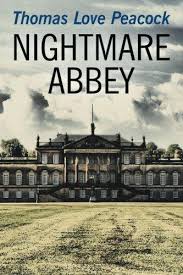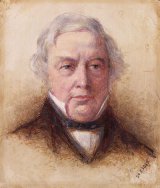Nightmare Abbey Page #3
Nightmare Abbey is an 1818 novella by Thomas Love Peacock, and his third long work of fiction to be published.
* * * * * CHAPTER II Shortly after the disastrous termination of Scythrop's passion for Miss Emily Girouette, Mr Glowry found himself, much against his will, involved in a lawsuit, which compelled him to dance attendance on the High Court of Chancery. Scythrop was left alone at Nightmare Abbey. He was a burnt child, and dreaded the fire of female eyes. He wandered about the ample pile, or along the garden-terrace, with 'his cogitative faculties immersed in cogibundity of cogitation.' The terrace terminated at the south-western tower, which, as we have said, was ruinous and full of owls. Here would Scythrop take his evening seat, on a fallen fragment of mossy stone, with his back resting against the ruined wall,--a thick canopy of ivy, with an owl in it, over his head,--and the Sorrows of Werter in his hand. He had some taste for romance reading before he went to the university, where, we must confess, in justice to his college, he was cured of the love of reading in all its shapes; and the cure would have been radical, if disappointment in love, and total solitude, had not conspired to bring on a relapse. He began to devour romances and German tragedies, and, by the recommendation of Mr Flosky, to pore over ponderous tomes of transcendental philosophy, which reconciled him to the labour of studying them by their mystical jargon and necromantic imagery. In the congenial solitude of Nightmare Abbey, the distempered ideas of metaphysical romance and romantic metaphysics had ample time and space to germinate into a fertile crop of chimeras, which rapidly shot up into vigorous and abundant vegetation. He now became troubled with the passion for reforming the world.[2] He built many castles in the air, and peopled them with secret tribunals, and bands of illuminati, who were always the imaginary instruments of his projected regeneration of the human species. As he intended to institute a perfect republic, he invested himself with absolute sovereignty over these mystical dispensers of liberty. He slept with Horrid Mysteries under his pillow, and dreamed of venerable eleutherarchs and ghastly confederates holding midnight conventions in subterranean caves. He passed whole mornings in his study, immersed in gloomy reverie, stalking about the room in his nightcap, which he pulled over his eyes like a cowl, and folding his striped calico dressing-gown about him like the mantle of a conspirator. 'Action,' thus he soliloquised, 'is the result of opinion, and to new-model opinion would be to new-model society. Knowledge is power; it is in the hands of a few, who employ it to mislead the many, for their own selfish purposes of aggrandisement and appropriation. What if it were in the hands of a few who should employ it to lead the many? What if it were universal, and the multitude were enlightened? No. The many must be always in leading-strings; but let them have wise and honest conductors. A few to think, and many to act; that is the only basis of perfect society. So thought the ancient philosophers: they had their esoterical and exoterical doctrines. So thinks the sublime Kant, who delivers his oracles in language which none but the initiated can comprehend. Such were the views of those secret associations of illuminati, which were the terror of superstition and tyranny, and which, carefully selecting wisdom and genius from the great wilderness of society, as the bee selects honey from the flowers of the thorn and the nettle, bound all human excellence in a chain, which, if it had not been prematurely broken, would have commanded opinion, and regenerated the world.' Scythrop proceeded to meditate on the practicability of reviving a confederation of regenerators. To get a clear view of his own ideas, and to feel the pulse of the wisdom and genius of the age, he wrote and published a treatise, in which his meanings were carefully wrapt up in the monk's hood of transcendental technology, but filled with hints of matter deep and dangerous, which he thought would set the whole nation in a ferment; and he awaited the result in awful expectation, as a miner who has fired a train awaits the explosion of a rock. However, he listened and heard nothing; for the explosion, if any ensued, was not sufficiently loud to shake a single leaf of the ivy on the towers of Nightmare Abbey; and some months afterwards he received a letter from his bookseller, informing him that only seven copies had been sold, and concluding with a polite request for the balance. Scythrop did not despair. 'Seven copies,' he thought, 'have been sold. Seven is a mystical number, and the omen is good. Let me find the seven purchasers of my seven copies, and they shall be the seven golden candle-sticks with which I will illuminate the world.' Scythrop had a certain portion of mechanical genius, which his romantic projects tended to develope. He constructed models of cells and recesses, sliding panels and secret passages, that would have baffled the skill of the Parisian police. He took the opportunity of his father's absence to smuggle a dumb carpenter into the Abbey, and between them they gave reality to one of these models in Scythrop's tower. Scythrop foresaw that a great leader of human regeneration would be involved in fearful dilemmas, and determined, for the benefit of mankind in general, to adopt all possible precautions for the preservation of himself. The servants, even the women, had been tutored into silence. Profound stillness reigned throughout and around the Abbey, except when the occasional shutting of a door would peal in long reverberations through the galleries, or the heavy tread of the pensive butler would wake the hollow echoes of the hall. Scythrop stalked about like the grand inquisitor, and the servants flitted past him like familiars. In his evening meditations on the terrace, under the ivy of the ruined tower, the only sounds that came to his ear were the rustling of the wind in the ivy, the plaintive voices of the feathered choristers, the owls, the occasional striking of the Abbey clock, and the monotonous dash of the sea on its low and level shore. In the mean time, he drank Madeira, and laid deep schemes for a thorough repair of the crazy fabric of human nature. * * * * * CHAPTER III Mr Glowry returned from London with the loss of his lawsuit. Justice was with him, but the law was against him. He found Scythrop in a mood most sympathetically tragic; and they vied with each other in enlivening their cups by lamenting the depravity of this degenerate age, and occasionally interspersing divers grim jokes about graves, worms, and epitaphs. Mr Glowry's friends, whom we have mentioned in the first chapter, availed themselves of his return to pay him a simultaneous visit. At the same time arrived Scythrop's friend and fellow-collegian, the Honourable Mr Listless. Mr Glowry had discovered this fashionable young gentleman in London, 'stretched on the rack of a too easy chair,' and devoured with a gloomy and misanthropical nil curo, and had pressed him so earnestly to take the benefit of the pure country air, at Nightmare Abbey, that Mr Listless, finding it would give him more trouble to refuse than to comply, summoned his French valet, Fatout, and told him he was going to Lincolnshire. On this simple hint, Fatout went to work, and the imperials were packed, and the post-chariot was at the door, without the Honourable Mr Listless having said or thought another syllable on the subject.
Translation
Translate and read this book in other languages:
Select another language:
- - Select -
- 简体中文 (Chinese - Simplified)
- 繁體中文 (Chinese - Traditional)
- Español (Spanish)
- Esperanto (Esperanto)
- 日本語 (Japanese)
- Português (Portuguese)
- Deutsch (German)
- العربية (Arabic)
- Français (French)
- Русский (Russian)
- ಕನ್ನಡ (Kannada)
- 한국어 (Korean)
- עברית (Hebrew)
- Gaeilge (Irish)
- Українська (Ukrainian)
- اردو (Urdu)
- Magyar (Hungarian)
- मानक हिन्दी (Hindi)
- Indonesia (Indonesian)
- Italiano (Italian)
- தமிழ் (Tamil)
- Türkçe (Turkish)
- తెలుగు (Telugu)
- ภาษาไทย (Thai)
- Tiếng Việt (Vietnamese)
- Čeština (Czech)
- Polski (Polish)
- Bahasa Indonesia (Indonesian)
- Românește (Romanian)
- Nederlands (Dutch)
- Ελληνικά (Greek)
- Latinum (Latin)
- Svenska (Swedish)
- Dansk (Danish)
- Suomi (Finnish)
- فارسی (Persian)
- ייִדיש (Yiddish)
- հայերեն (Armenian)
- Norsk (Norwegian)
- English (English)
Citation
Use the citation below to add this book to your bibliography:
Style:MLAChicagoAPA
"Nightmare Abbey Books." Literature.com. STANDS4 LLC, 2024. Web. 23 Nov. 2024. <https://www.literature.com/book/nightmare_abbey_48>.




Discuss this Nightmare Abbey book with the community:
Report Comment
We're doing our best to make sure our content is useful, accurate and safe.
If by any chance you spot an inappropriate comment while navigating through our website please use this form to let us know, and we'll take care of it shortly.
Attachment
You need to be logged in to favorite.
Log In